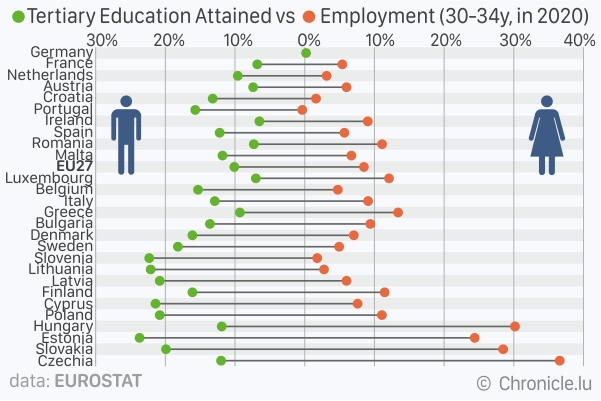
Data extracted from European statistics agency Eurostat have shown that despite more young women than men in the European Union (EU) having attained tertiary education, fewer of them were employed compared to their male counterparts in 2020.
While the number of women aged 30 to 34 having attained tertiary education was 10.1% higher than men of the same age in the EU in 2020, the former counterintuitively lagged by 8.5% on average in employment.
In terms of the total working population of age 15 to 64, Luxembourg reported that 40.9% of its residents had attained tertiary education (at least Bachelor’s degree or equivalent) in 2020. In the EU, Ireland reported the highest share of 42.8%, whilst Romania had the lowest share of 16.2% of the respective working age population.
In terms of the younger population, Luxembourg recorded the highest share in the EU with 62.2% of residents aged 30 to 34 having attained tertiary education - higher than the EU average of 41.0%. In terms of a gender gap, 65.7% of female residents in Luxembourg aged 30 to 34 had sttained tertiary education, outpacing men (58.7%) by 7.0% in 2020.
The gender gap in terms of tertiary education attainment in women aged 30 to 34 was largest in Estonia (23.7%), Slovenia (22.3%) and Lithuania (22.1%). The smallest gap and the only Member State with more men than women having attained tertiary education was recorded in Germany, with 0.2% fewer women (36.2%) than men (36.4%).
In terms of employment, 86.5% of EU residents aged 30 to 34 with at least a Bachelor's or equivalent degree reported being employed in 2020 (data for Germany not available), with the highest percentages recorded in the Netherlands (92.7%), Slovenia (92.5%) and Malta (92.0%) and the lowest share in Greece (76.6%), the Czech Republic (76.8%) and Slovakia (77.8%). Luxembourg reported that 87.9% of its residents aged 30 to 34 with tertiary education were in employment in 2020.
A gender gap in employment, with the exception of Portugal, men consistently outpaced women in all EU Member States (data for Germany not available) in 2020.
In Luxembourg, 94.2% of men aged 30 to 34 with tertiary education were employed in 2020, 12.1% more compared to women (82.1%).
The highest gender gap in employment for men aged 30 to 34 with tertiary education compared to women in 2020 was recorded in the Czech Republic (36.6%), Hungary (30.2%) and Slovakia (28.5%) and the lowest share in Portugal (0.35% more women employed than men), Croatia (1.6%) and Slovenia (1.8%).
Note that the tertiary education attainment takes into account all residents aged 30 to 34 while the employment statistics concern residents aged 30 to 34 having attained tertiary education.








